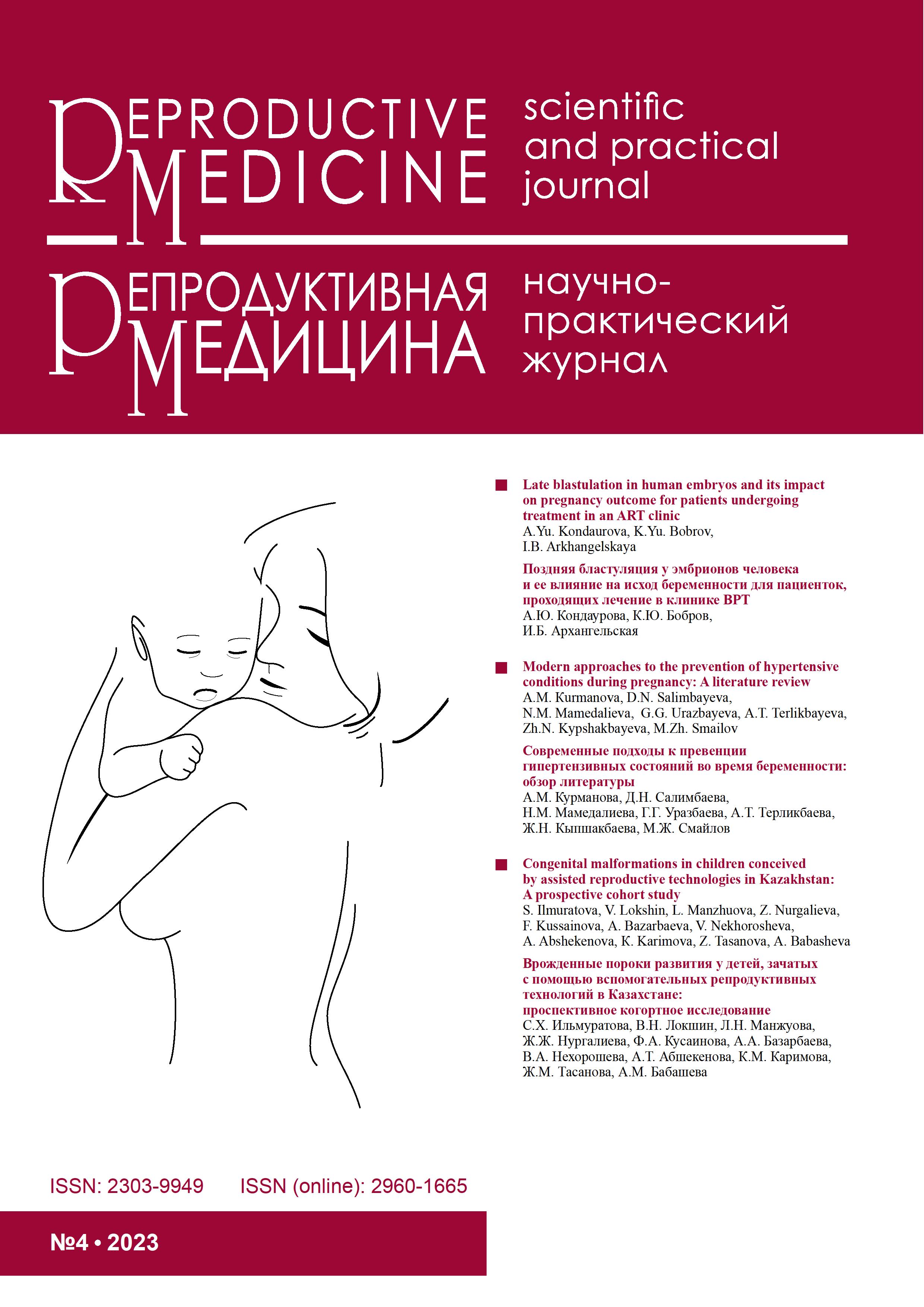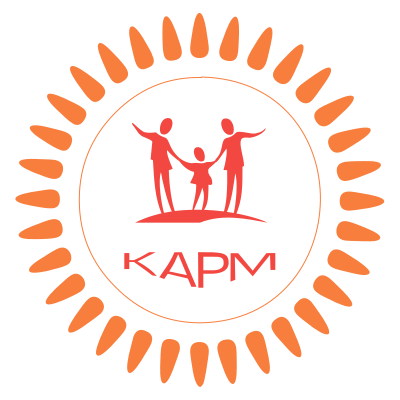Treatment outcomes in patients with nonclassic congenital adrenal hyperplasia (NCAH)
DOI:
https://doi.org/10.37800/RM.4.2023.67-75Keywords:
nonclassic congenital adrenal hyperplasia (NCAH), infertility, polycystic ovary syndrome (PCOS), hyperandrogenemiaAbstract
Relevance: Congenital adrenal hyperplasia (CAH) is an autosomal recessive that quite often leads to impaired reproductive function. Nonclassic form of CAH (NCAH) is a «mild» variant of the disease with a heterogeneous clinical picture. Difficulties in diagnosis and further management of such patients determine the relevance of this problem. The problem of diagnosing nfCACD has several aspects. First, a hidden clinical picture and latent course of symptoms correlate with the degree of enzyme deficiency. Another aspect is the lack of awareness of doctors about this pathology and the underestimation of its importance for reproductive functions.
The study aimed to analyze the main reasons for the primary treatment of women with newly diagnosed nfCACD, evaluate the clinical effectiveness of the pathogenetic treatment approach in complex therapy in women with nfCACD, and reveal a possible correlation between 17-OH-progesterone levels and clinical symptoms.
Materials and methods: The study involved 137 women examined and treated at the Sanad Medical Center (Karaganda, Kazakhstan) from 2020 to 2022. Of them, 97 were first diagnosed with NCAH, and 40 made a control group. All women received prednisone 1.25 to 5 mg per for adrenal hyperandrogenism. Statistical data processing was done using the Student’s t-test for independent populations; the statistical relationship was determined using the Pearson correlation criterion. The critical level of significance when testing statistical hypotheses was taken equal to 0.05.
Results: In the study, the severity of clinical manifestations depended on the 17-OH-progesterone level. Major complaints included menstrual cycle disorders, acne, weight gain, and premenstrual syndrome.
The prednisone therapy improved the skin and nervous system conditions and anthropometric data in 100% of cases; 21% of patients had a desired pregnancy.
Conclusion: Most clinical manifestations, such as acne, menstrual cycle disorders, premenstrual syndrome, and infertility, were non-specific for NCAH. Patients of reproductive age with impaired fertility shall be tested for 17-OH-progesterone as a NCAH marker. Early referral to an endocrinologist will help identify this abnormality and achieve positive results, e.g., using glucocorticosteroid replacement therapy.
References
Мокрышева Н.Г., Мельниченко Г.А., Адамян Л.В., Трошина Е.А., Молашенко Н.В., Сазонова А.И., Уварова Е.В., Есаян Р.М., Андреева Е.Н., Ужегова Ж.А., Карева М.А., Калинченко Н.Ю., Шифман Б.М., Фадеев В.В., Бирюкова Е.В., Анциферо в М.Б., Суплотова Л.А., Киселева Т.П., Ярмолинская М.И., Сутурина Л.В. Клинические рекомендации «врожденная дисфункция коры надпочечников (адреногенитальный синдром)». Ожирение и метаболизм. 2021;18(3):345-382.
Mokrysheva NG, Mel'nichenko GA, Adamyan LV, Troshina EA, Molashenko NV, Sazonova AI, Uvarova EV, Esayan RM, Andreeva EN, Uzhegova ZhA, Kareva MA, Kalinchenko NYu, Shifman BM, Fadeev VV, Biryukova EV, Anciferov MB, Suplotova LA, Kiseleva TP, Yarmolinskaya MI, Suturina LV. Clinical recommendations, “Congenital dysfunction of the adrenal cortex (adrenogenital syndrome).” Ожирение и метаболизм. 2021;18(3):345-382. (In Russ.).
https://doi.org/10.14341/omet12787
Петров Ю.А., Купина А.Д. Влияние неклассической формы врожденной дисфункции коры надпочечников на репродуктивное здоровье. Современные проблемы науки и образования. 2019;2.
Petrov JuA, Kupina AD. The influence of a non-classical form of congenital adrenal cortex dysfunction on reproductive health. Modern problems of science and education [Internet]. 2019 Mar 11 [cited 2023 May 12];2. (in Russ.). Available from:
https://science-education.ru/ru/article/view?id=28625
Пшак В.П., Ризничук М.О. Адреногенитальный синдром: молекулярные механизмы развития. Межд Эндокринол Ж. 2017;2:195-200.
Pshak VP, Riznichuk MO Adrenogenital syndrome: molecular mechanisms of development. Vezhd Endocrinol Zh. 2017;2:195-200. (In Russ.).
https://cyberleninka.ru/article/n/adrenogenitalnyy-sindrom-molekulyarnye-mehanizmy-razvitiya/viewer
Абсатарова Ю.С., Евсеева Ю.С., Андреева Е.Н. Нейроэндокринные особенности патогенеза синдрома поликистозных яичников (обзор литературы). Пробл эндокринологии. 2023;69(5):107-114.
Absatarova YS., Evseeva YS., Andreeva EN. Neuroendocrine features of the pathogenesis of polycystic ovary syndrome (literature review). Probl Endocrinol. 2023;69(5):107-114. (In Russ.).
https://doi.org/10.14341/probl13350
Манухин И.Б. Гинекологическая эндокринология: Клинические лекции. М.: ГЭОТАР-Медиа; 2017. 304 с. ISBN 978-5-9704-4077-3.
Manuhin IB. Gynecological endocrinology: Clinical lectures. M.: GEOTAR-Media; 2017. 304 p. ISBN 978-5-9704-4077-3. (In Russ.)
Баисова Б.И., Савельева Г.М., Бреусенко В.Г. Гинекология: учебник. Изд. 4-е. М.: ГЭОТАР-Медиа; 2018. 432 с. ISBN 9785970429945.
Baisova BI, Savel'eva GM, Breusenko VG. Gynecology: textbook. Ed. 4. M.: GEOTAR-Media; 2018. 432 p. ISBN 9785970429945. (in Russ.).
http://www.studentlibrary.ru/book/ISBN9785970429945.html
Себко Т.В., Хейдар Л.А., Конеева С.С. Гиперпролактинемия. Рос. Мед. Ж. 2016;5(22):250-257.
Sebko TV, Xejdar LA, Koneeva SS. Hyperprolactinemia. Ros Med Zh. 2016;5(22):250-257. (In Russ.).
https://www.medlit.ru/journalsview/medicaljournal/view/journal/2016/issue-5/387-giperprolaktinemiya/
Sekar Arum VR, Yuniastuti A, Kasimi OW. The Relationship of Nutritional Status, Physical Activity, Stress, and Menarche to Menstrual Disorder (Oligomenorrhea). Public Health Perspect J. 2019;4(1):37-47.
Jha S, Turcu AF. Non-classic Congenital Adrenal Hyperplasia: What Do Endocrinologists Need to Know? Endocrinol Metabol Clin N Am. 2021;50(1):151-165. https://doi.org/10.1016/j.ecl.2020.10.008
Подзолкова Н.М. Бесплодие. Диагностика, современные методы лечения. М.: ГЭОТАР-Медиа; 2019. 144 с. ISBN 978-5-9704-5231-8.
Podzolkova NM. Infertility. Diagnostics, modern methods of treatment. M.: GEOTAR-Media; 2019. 144 p. (In Russ.). ISBN 978-5-9704-5231-8.
https://www.rosmedlib.ru/book/ISBN9785970452318.html
Трубникова Л.И., Вознесенская Н.В., Таджиева В.Д., Корнилова Т.Ю., Албутова М.Л., Тихонова Н.Ю. Актуальные вопросы гинекологии: уч.-метод. пособие. Ульяновск: УлГУ; 2019. 409 p.
Trubnikova LI, Voznesenskaja NV, Tadzhieva VD, Kornilova TJu, Albutova ML, Tihonova NJu. Current issues in gynecology: educational and methodological manual. Ulyanovsk: UlGU; 2019. 409 p. (in Russ.).
https://www.books-up.ru/en/book/aktualnye-voprosy-ginekologii-13661514/
Коркан А., Туреханова А., Тюгай Ю. Современные методы лечения синдрома поликистозных яичников: обзор литературы. Репрод мед. 2020;1(42):27-34.
Korkan A, Turexanova A, Tyugaj Yu. Modern methods of treatment of polycystic ovary syndrome: a review of the literature. Reprod Med. 2020;1(42):27-34. (In Russ.).
https://doi.org/10.37800/rm2020-1-5
Серов В.Н., Прилепская В.Н., Овсянникова Т.Н. Гинекологическая эндокринология. М.: Медпресс-Информ; 2015. 512 c. ISBN 978-5-907504-67-7.
Serov VN, Prilepskaya VN, Ovsyannikova TN. Gynecological endocrinology. M.: Medpress-Inform; 2015. 512 p. ISBN 978-5-907504-67-7. (In Russ.).
https://profbook.com.ua/index.php?route=product/product/download&product_id=7176&download_id=460
Мишарина Е.В., Бородина В.Л., Главнова О.Б., Николаенков И.П., Потин В.В., Тарасова М.А. Инсулинорезистентность и гиперандрогенемия. Ж Акуш Жен Бол. 2016;1:75-86.
Misharina EV, Borodina VL, Glavnova OB, Nikolaenkov IP, PotinVV, Tarasova MA. Insulin resistance and hyperandrogenemia. Zh Akush Zhen Bol. 2016;1:75-86. (In Russ.).
https://doi.org/10.17816/JOWD65175-86
Астафьева Л., Локшин В., Сиднева Ю. Карибаева Ш. Гиперпролактинемия: клинические проявления, диагностика и методы лечения. Обзор современных данных литературы. Репрод мед. 2019;2(39):63-69.
Astafieva L, Lokshin V, Sidneva Yu, Karibaeva Sh. Hyperprolactinemia: clinical manifestations, diagnosis and treatment methods. Review of current literature data. Reprod Мed. 2019;2(39):63-69. (In Russ.).
https://repromed.kz/index.php/journal/article/view/103
Falhammar H., Nordenström A. Non-classic congenital adrenal hyperplasia due to 21-hydroxylase deficiency: clinical presentation, diagnosis, treatment, and outcome. Endocrine. 2015;50(1):32-50.
https://doi.org/10.1007/s12020-015-0656-0
Azziz R, Hincapie LA, Knochenhauer ES, Dewailly D, Fox L, Boots LR. Screening for 21-hydroxylase-deficient nonclassic adrenal hyperplasia among hyperandrogenic women: a prospective study. Fertil Steril. 1999;5(72):915-925.
https://doi.org/10.1016/s0015-0282(99)00383-0
Гродницкая Е.Э., Курцер М.А. Неклассическая форма врожденной дисфункции коры надпочечников в практике акушера-гинеколога. Акуш Гинекол. 2016;5:33-37.
Grodnickaya EE, Kurcer MA. A non-classical form of congenital dysfunction of the adrenal cortex in the practice of an obstetrician-gynecologist. Akush Ginekol. 2016;5:33-37. (In Russ.).
Downloads
Published
How to Cite
Issue
Section
License
Copyright (c) 2023 The rights to a manuscript accepted for publication are transferred to the Journal Publisher. When reprinting all or part of the material, the author must refer to the primary publication in this journal.

This work is licensed under a Creative Commons Attribution-NonCommercial-NoDerivatives 4.0 International License.
The articles published in this Journal are licensed under the CC BY-NC-ND 4.0 (Creative Commons Attribution – Non-Commercial – No Derivatives 4.0 International) license, which provides for their non-commercial use only. Under this license, users have the right to copy and distribute the material in copyright but are not permitted to modify or use it for commercial purposes. Full details on the licensing are available at https://creativecommons.org/licenses/by-nc-nd/4.0/.




